
Blog: India; first impressions and IAPCON 2017
![]() Cairdeas
Cairdeas
![]() 4th April 2017
4th April 2017
We are delighted to have offered regular travel scholarships for partners who are presenting work at the annual Indian palliative care conference and this year we supported Hamilton Inbadas ( Cairdeas Trustee) who was delivering a plenary and Dr Elizabeth Namukwaya who is the clinical head at the Makerere Pallaitive Care Unit alomg with Dr Mhoira Leng. These cross exchange and south to south interacations are so rich and Cairdeas is keen to develop this further. The opportunity for sharing, learning, being inspired and forming collaborations for the future is so important. Dr Liz shares her experience as a first time Indian visitor, being mentored in Indian dress and culture and of the conference where she was presenting work from her excellent PhD and from MPCU. Please find PDFs of the presentations including Dr Liz under our resources section and this includes several posters and 2 sessions on refugees needs in palliative care and our work with Gaza colleagues.
'On the 6th of February 2017 I had my first travel to India and it was the first time to travel by Etihad airlines. I was going for the IAPCON conference in Coimbatore. I travelled with Dr.Mhoira and to her India is another home this was very helpful because gave me some lessons on Indian dressing and food along the way and introduced me to some of the culture there, including the meaning of the head shaking. Even with this information I did not really know what to expect. We arrived at Coimbatore very early in the morning the next day and found the conference organisers had prepared transport for us. As we travelled to our hotel what stood out for me was the hooting. In Uganda people hoot but in India it is at another level but whereas in Uganda it may be offensive in India it is acceptable and a form of communication letting the other driver know you are coming right behind him or overtaking him and so I got used to this very quickly. Once at the hotel we were served with a delicious breakfast and I had my first taste of many India breakfast foods. I was amazed at the many number of ways rice can be processed and cooked. Although initially the foods were spicy for me there were delicious and I soon accepted them (though took my antacids regularly).
We were booked in the lovely Residency Hotel and the staff there were just excellent; the best I have seen in all the hotels I have ever gone too. They were extremely polite and always willing to help all the time. The rooms were very well cleaned every day and internet access was great.
Another reason I was so glad to travel with Mhoira was that she knew the best shopping places in India with good quality clothing and good prices and she took me to Fab India and after a few hours there, I was ready to attend the conference dressed in a culturally appropriately way. We used an auto vehicle and it was a fun ride. Mhoira introduced me to her family in India, lovely and great people whom I was so honoured to meet. I was very impressed by Mhoira’s ability to recall the names of the hundreds of the people at the conference some of whom she had met sometime back.
The conference was attended with many other friends from the UK, South Africa and Australia and it was great to see them all again. Together with friends we had a tour of Coimbatore and Ooty. We so enjoyed the breath taking scenes up on the mountain in Ooty and appreciated the greatness and wisdom of God through all the variety and beauty of nature, my heart was singing ‘How great Thou art’. We saw a variety of the Indian living conditions ranging from posh areas to poor areas. There was so much similarity between the living conditions there and those of many areas in Uganda. We also saw the great art on their temples and learned a bit about their religions. I was impressed in Ooty by the government’s efforts in nature, having gardens for tourism and study purposes. Another highlight of our tours was the car museum in Coimbatore recommnede by Dr Balaji, the conference organiser and local resident; it was very impressive.
The conference was very well organised, time management was good most of the time and the people were really very friendly. I really liked it that the conference included people from so many disciplines in medicine and nursing and I learned a lot from specialists from these disciplines and it gave me research ideas. I was amused that most people had not seen a black African person and often asked me where I came from, stared at me and asked to have photos with me, even children. The day I had most photos with people who did not know me was the day I wore a saree, I caught many people looking at me and showing others that I was in a saree. I often see this happen to white people in Uganda and now I also got to experience this myself. For me it was not offensive as they were genuinely not used to seeing someone like me and with my braided hair style which was also a common question on how I did it. I enjoyed the different foods served at the conference and at the hotel especially chicken biryani. I also enjoyed the entertainment from the children with disabilities and the music group on the last evening.
At this conference, I had the opportunity to present in 3 sessions. The first presentation was part of a qualitative research workshop where I presented an example of how qualitative research can be done in palliative care using my PhD experience and the title of the presentation was: ‘The experience of living and Dying with Heart failure in Uganda’. My other 2 presentations were in the free communications sessions and I presented another aspect of my research titled: ‘The multidimensional experiences and needs of Ugandan patients with heart failure’. The third presentation that I did on behalf of my colleague Dr. Jack Turyahikayo who was unable to attend the conference and it was titled: ‘Outcomes of care among patients supported by specialist palliative care services in Mulago hospital’. I thank the conference organisers for the opportunity to share those presentations. I had great feedback from the audience being able to present created opportunities for future collaboration and networking from the audience.
I was priviledged to listen to the work of some of the leading people in palliative care in India and in the world, whose work I had read and it was good to attach faces to their names. I was very happy to be introduced to them by Dr. Mhoira who is a friend to all of them and to get their contacts and I hope this will open doors for collaborations in the future.
I was very impressed with the posters and the conference program that was very inclusive of many aspects and dimensions of palliative care. The topics were very interesting that it was difficult to choose where to go because many times these sessions were running in parallel. The presentations were of high quality and evoked rich discussions. It was very inspiring and encouraging to hear from the chief guest and guest of honor, their personal and their relatives’ experiences of living with chronic illnesses and how they coped and experienced growth with these experiences. It was also motivating to hear their positive experiences of receiving palliative care. Working with dying patients and suffering people most of the time sometimes makes you wonder if your personal concept of making a difference in people’s lives is the same as that for patients and their families, because most times you seldom get feedback, therefore hearing these testimonies at the conference was very encouraging to me as a practitioner to continue with this work of palliative care.
The presentations on palliative care for vulnerable populations entitled ‘Hidden lives , hidden patients’ were eye-opening and made me reflect more on how we should extend our care to these groups of people in my country. Another thing that stood out for me was how specialists from multiple disciplines have been involved in palliative care in India, there were presentations made by neurologists, urologists, radiologists, physiotherapists, psychiatrists, occupational therapists, psychologists etc. This was very impressive and I learned a lot from these specialists even in these few sessions. I realized this is a great opportunity for mutual learning for palliative care specialists and other specialists. Although we have multidisciplinary meetings with oncologists in Uganda this is not so common for other disciplines and and I hope to engage these other specialists in Mulago hospital so that we engage in multidisciplinary meetings which may foster joint research and conferences in the future.
I thank Mhoira and Cairdeas for the opportunity and I hope that one day I shall go back to see more of this country.'
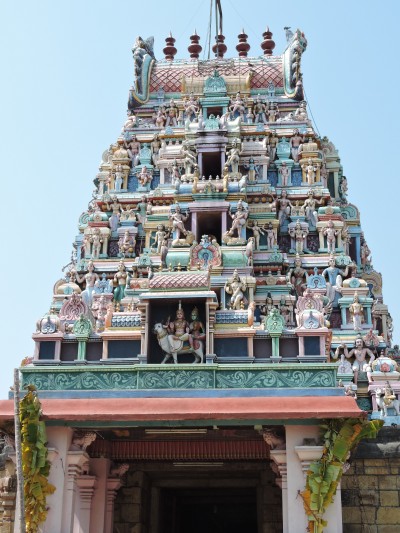
Arulmigu Patteeswarar Temple in Coimbatore
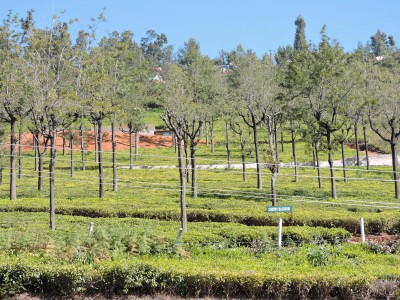
Tea plantations in Ooty
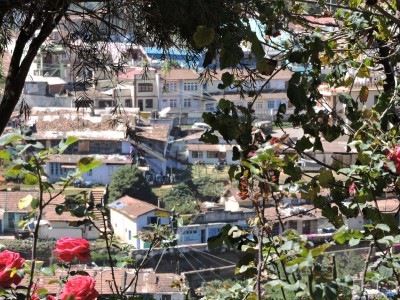
Ooty town
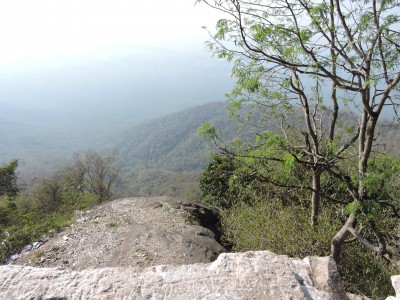
Mountain views
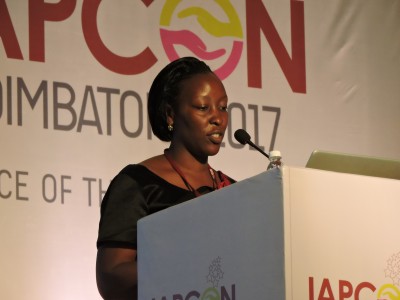
Liz presenting
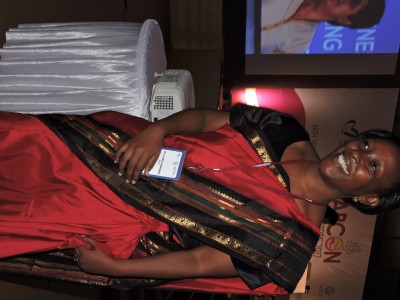
Liz in saree...sorry photo not aligned!
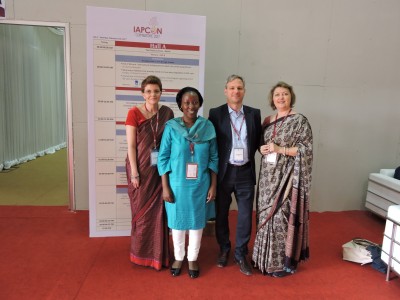
Liz with Julia Downing, Mhoira Leng and Brett Sutton
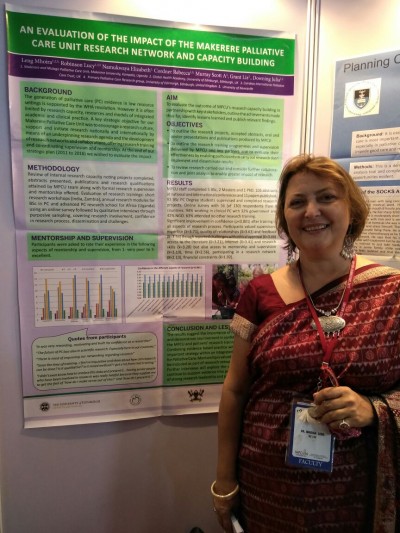
Mhoira with our poster on the impact of the MPCU research strategy
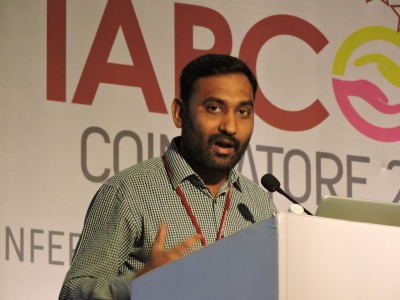
Hamilton Inbadas; Cairdeas Trustee presenting a great plenary on 'Philosophical and cultural situatedness of spirituality in palliative care.'
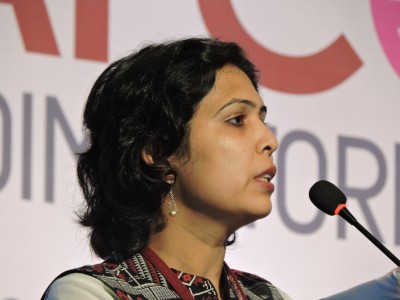
Dr Savita from EHA giving such a moving talk about transgender issues and palliative care
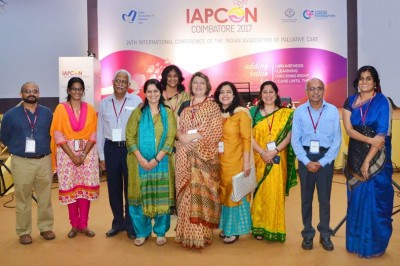
Dr Balaji (conference organiser) and our good friend Dr Chitra Venkateswaran who was such a great scientific chairperson.
